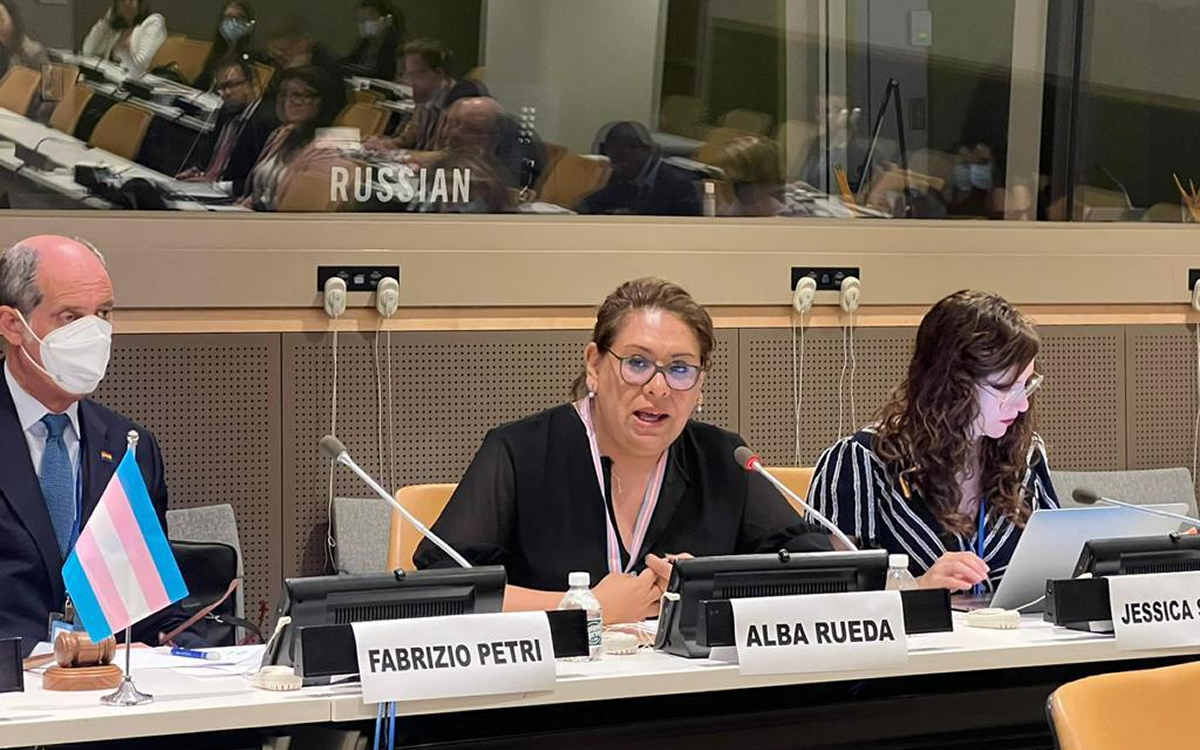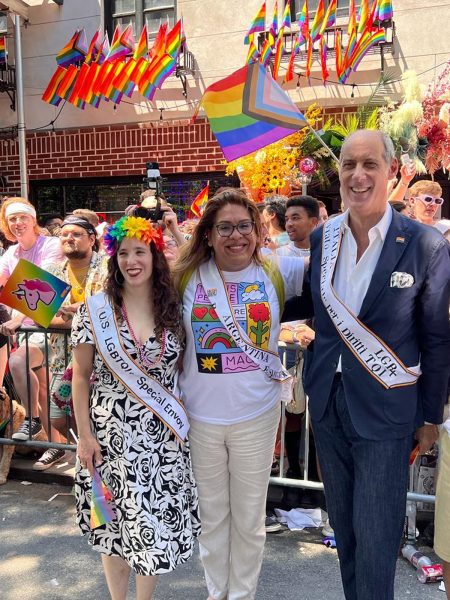South America
Meet Argentina’s special envoy for LGBTQ and intersex rights
Alba Rueda is a transgender woman, long-time activist

Editor’s note: The Washington Blade interviewed Alba Rueda before the murder of Alejandra Ironici, a prominent transgender activist, in Santa Fe on Aug. 22 and the attempted assassination of Vice President Cristina Fernández de Kirchner in Buenos Aires on Sept. 1.
Argentina is a pioneer in the implementation of laws and public policies that support LGBTQ and intersex rights.
The country in 2010 became the first in South America to extend marriage rights to same-sex couples. Argentina in 2021 became the second country in the Americas to offer nonbinary national ID cards.
A transgender rights law and a labor quota for trans people, among other things, have been implemented since then. These initiatives, in most cases, have inspired neighboring countries to recognize LGBTQ and intersex people.
Argentina this year created a position within the country’s Foreign Affairs Ministry that focuses exclusively on the promotion of LGBTQ and intersex rights abroad.
Alba Rueda, a well-known queer activist, on May 2 became Argentina’s first-ever Special Representative on Sexual Orientation and Gender Identity. The U.S., the U.K., Italy and Germany are the four other countries with people in their respective governments who specifically promote LGBTQ and intersex rights abroad.

Rueda, 46, is a trans woman who was born in Salta province in northern Argentina.
She moved to Buenos Aires with her family when she was a teenager. Rueda became an activist at an early age and has held various public positions over the last two decades.
Rueda was previously Argentina’s first undersecretary of diversity policies in the Women, Gender and Diversity Ministry. She is the first trans woman to hold a senior position in the country’s government.
Rueda explained to the Washington Blade that her position is one “that deals exclusively with foreign policy regarding diversity policies.”
“We are within the State’s structure,” she said. “We are in a very unique position within this ministry’s political agenda.”
For her, the advances in LGBTQ and intersex rights in Argentina have great relevance because activists and the movements of which they are a part had good strategies that influenced the political arena.
“The trasvestí and transgender community knew how to anchor (themselves) in the militancy of human rights,” she said. “The 2012 gender identity law is undoubtedly a milestone for all of Latin America because of its content. [It is] one of the first laws that set very high standards of rights in the world and that were really developed by the trans community in the sociopolitical organizations in which we participate.”
Rueda recalled that in 2006, before any legislation in favor of sexual and gender diversity took effect, the trans population won a legal battle when the Supreme Court ruled Asociación Lucha por la Identidad Travesti (ALITT), a trans advocacy group, could obtain legal status.
“This was a fundamental step within the political agenda and from then on a whole process of decriminalization began,” Rueda recalled to the Blade.
The advancement of LGBTQ and intersex rights in Argentina since then has not stopped, and that is why Rueda wants to replicate this work in countries across South America and around the world. Argentina, in fact, over the last year has hosted a variety of Global Equality Caucus-led workshops that have focused on the elimination of so-called conversion therapy.
“We are a team under my leadership, where we are working integrally with the Ministry of Foreign Affairs, carrying out different lines of work to strengthen the multilateral policies that our country has around certain agendas, as in the United Nations, for example,” she emphasized.
Regarding her efforts with other Latin American countries, Rueda said she will work to improve the quality of life of LGBTQ and intersex people based on efforts in Argentina.
“We are going for a coordination of State policy around LGBT rights, around living conditions; not only the promotion of rights, but of public policies that modify the structure of that inequality around living conditions,” Rueda stressed.
“There are several countries in Latin America and the Caribbean that do not have a gender identity law. With equal marriage, with a trans labor quota law and what we have here is not only an experience around public policies, but the evidence that this really strengthens and prevents other types of violence,” she added. “This is basically Argentina’s contribution to Latin American cooperation.”
Finally, she stressed that “it has to do precisely with the strengthening of a line of work which is to demonstrate the evidence that the greater the rights and recognition, the better not only the quality of democracy, but also the better the living conditions of our community and the reduction of violence.”
Chile
Transgender woman sues Chilean national police
Isabella Panes alleges she suffered harassment, exclusion after becoming ‘carabinera’

Isabella Panes in 2022 was celebrated as a symbol of inclusion.
Wearing an olive green uniform and a shy smile, she appeared in the media and on social media as Chile’s first trans female “carabinera” or national police officer. The Carabineros promoted Panes as a sign of openness, but that story has become a dramatic case of institutional discrimination.
Panes today faces the Carabineros in court.
She has denounced a series of systematic acts of exclusion, harassment at work, and violation of fundamental rights that she and her defense team maintains pushed her into a mental health crisis that almost cost her her life.
“My hope is that tomorrow we will be able to live in a world of equality for all. Just that we understand that we are human beings and we have to make life a lot easier for each other,” Panes told the Washington Blade during an exclusive interview.
Panes, 29, grew up in Laja in the Biobío region.
She dreamed of becoming a “carabinera” since she was a child, despite the fact that she faced discrimination because of her gender identity. After years of effort, surgeries and a difficult transition, Panes enrolled in the Carabineros Academy in 2021.
Panes faced the challenge of making her medical processes compatible with the physical demands of training. Even so, she graduated with good marks, and was recognized as part of the new institutional image the Carabineros wanted to project after the 2021 social unrest tarnished their image.
This institutional support disappeared after the media campaign.
Panes alleges she was marginalized from operational duties and relegated to administrative tasks, despite her interest in and training to patrol the streets like any other officers.
“I joined the Carabineros to serve, not to be a marketing decoration,” she said. “I was offered to be part of the change, but only if I kept quiet and accepted the mistreatment.”
The accusations against the Carabineros are serious: Constant mockery by colleagues, dissemination of private information about her personal life, invasive questions about her body and sexual orientation. Panes’s legal representatives said this abuse took place within a context where the institution did not take effective measures to protect their client.
The Carabineros Social Security Administration, known by the Spanish acronym Dipreca, also refused to cover her transition-related medical procedures, arguing they were “aesthetic,” despite medical reports that indicated their importance for Panes’s mental health and well-being.
Panes in January attempted to kill herself by suicide. She managed to survive after calling Chile’s 4141 mental health care number for help.
“They were killing me slowly, from the inside,” said Panes.
Panes has brought her case to the Supreme Court after a lower court ruled in favor of Dipreca’s decision to not cover her medical treatments.
Her legal team in a lawsuit has also accused the Carabineros of employment and systematic discrimination. Panes is seeking damages and institutional reforms.
“The Carabineros used Isabella to clean up its public image, but when it came to guaranteeing real rights, they abandoned her,” said Javiera Zúñiga, spokesperson for the Movement for Homosexual Integration and Liberation, a Chilean advocacy group.
“It is not enough to show up at the Pride march,” she added. “True inclusion is demonstrated in deeds, in daily dealings, in respect for the dignity of all people.”
Panes’s case starkly exposes the limits of diversity policies when there is no deep institutional commitment to implement them.
“I am no longer afraid,” said Panes, ”What happened to me cannot happen again. Not for me, but for all those who come after me.”
Brazil
US lists transgender Brazilian congresswoman’s gender as ‘male’ on visa
Erika Hilton has represented São Paulo since 2022

A transgender Brazilian congresswoman says the U.S. issued her a visa that listed her gender as “male.”
Erika Hilton on Wednesday wrote on her Instagram page that she requested a visa that would have allowed her to travel to the U.S. in order to participate in the Brazil Conference at Harvard University and the Massachusetts Institute of Technology.
The conference took place earlier this month.
“I was classified as ‘male’ by the U.S. government when I went to get my visa,” wrote Hilton, who added a visa she received from the U.S. in 2023 listed her gender as “female.”
Hilton is a Black travesti and former sex worker from São Paulo who won a seat in the Brazilian Congress in 2022. The Washington Blade spoke with Hilton shortly after her election.
“It is a big responsibility … but I feel very honored,” said Hilton. “I very much like to be able to be a representative for my people, and the more than 250,000 people who voted for me have confidence in me,” she said after she spoke at a rally in support of now Brazilian President Luiz Inácio Lula da Silva in a São Paulo square. “This demonstrates that our work has the potential to have a gigantic reach; where we can advance efforts to end death, poverty, misery, genocide that we have.”
President Donald Trump in his inaugural speech announced the federal government’s “official policy” is “there are only two genders, male and female.” The Trump-Vance administration has also banned the State Department from issuing passports with “X” gender markers.
Germany and Denmark are among the countries that have issued travel advisories for trans and nonbinary people who plan to visit the U.S. These warnings come ahead of WorldPride, which is scheduled to take place in D.C. from May 17-June 8.
Hilton said she is “not surprised” the U.S. issued her a visa with a male gender marker.
“I’m also not surprised by the level of hatred and fixation these people have with trans people,” she said. “After all, the documents I presented are rectified, and I’m registered as a woman, even on my birth certificate.”
Hilton further accused the U.S. of “ignoring official documents from other sovereign nations, even from a diplomatic representative.”
“At the end of the day, I’m a Brazilian citizen, and my rights are guaranteed and my existence is respected by our own constitution, legislation, and jurisprudence,” she said.
Editor’s note: Duda Salabert, another transgender Brazilian congresswoman, also said the U.S. listed her gender as “male” on her American visa.
Argentina
Gay, nonbinary parent fights for family in Argentina’s courts
Leonardo Hatanaka alleges they were fired after requesting paternity leave

An unprecedented case could set an important legal precedent for the rights of labor rights for LGBTQ families in Latin America.
Leonardo Hatanaka, a Brazilian pharmaceutical professional, expects an imminent ruling from the Superior Court of Justice in the Autonomous City of Buenos Aires in a case that alleges discriminatory dismissal based on sexual orientation, gender identity, and xenophobia after their son Matteo’s birth in Argentina via “solidarity gestation.” Human rights organizations and international agencies have followed the case closely.
Genzyme de Argentina S.A. and Sanofi in 2023 fired Hatanaka weeks after they notified them of their son’s paternity and requested 180-day parental leave.
“Matteo’s birth was the realization of a dream and the right to form a family with love, dignity and equality, even if that means having to fight every day for our family to be recognized as such,” Hatanaka told the Washington Blade in an exclusive interview.
The National Institute Against Discrimination, Xenophobia and Racism, a government agency known by the acronym INADI that President Javier Milei’s administration has shut down, in November 2023 said Hatanka’s termination was motivated by discrimination based on sexual orientation and gender identity.
(Milei took office in December 2023.)
The General Directorate of Coexistence in Diversity in Buenos Aires’s government in 2024 said institutional xenophobia motivated the firing.
“I am a gay man, foreign, nonbinary, and I had requested to exercise my right to parental leave,” Hatanaka explained. “The company denied access to a basic right to care, which it does provide in other countries, and did not provide any medical coverage for our son, despite his legal registration with both parents’ names.”
Sanofi did not acknowledge responsibility, offer apologies or any kind of reparations, despite the two rulings.
“It was devastating. I was caring for a newborn, at a moment of enormous vulnerability, and the company chose just that moment to abandon us,” said Hatanaka.
The National Labor Court overturned an initial injunction that ordered Hatanaka’s reinstatement. Hatanaka appealed the decision to the Superior Court of Justice in the Autonomous City of Buenos Aires.
“I hope for justice; that the discrimination suffered is recognized, and that this ruling serves as a precedent for all diverse families and LGBTQ+ people who are seeing their rights violated,” said Hatanaka.
The Argentine LGBT Federation, SOS Homophobie in France, and Mothers of Resistance in Brazil are among the organizations that have expressed their support. The latest U.N. report on anti-LGBTQ discrimination also notes the case.
“Companies must go beyond marketing,” Hatanaka emphasized. “Real inclusion requires concrete actions, consistency, and respect for their own policies.”
Hatanaka stressed that “there are instruments such as the UN Guiding Principles on Business and Human Rights. It is time for them to comply with them.” The lawsuit has also become a symbol of the struggle for equality and protection of families with parents who are the same sex.
“I feel I represent many LGBTQ+ families who live in fear of losing everything by exercising their rights,” said Hatanaka. “LGBTQ+ parenting is legitimate, real and deserves protection. No family should be punished for existing.”
-

 State Department4 days ago
State Department4 days agoHIV/AIDS activists protest at State Department, demand full PEPFAR funding restoration
-

 Brazil4 days ago
Brazil4 days agoUS lists transgender Brazilian congresswoman’s gender as ‘male’ on visa
-

 District of Columbia4 days ago
District of Columbia4 days agoCapital Pride wins $900,000 D.C. grant to support WorldPride
-

 Mexico3 days ago
Mexico3 days agoGay couple claims Puerto Vallarta wedding venue discriminated against them











